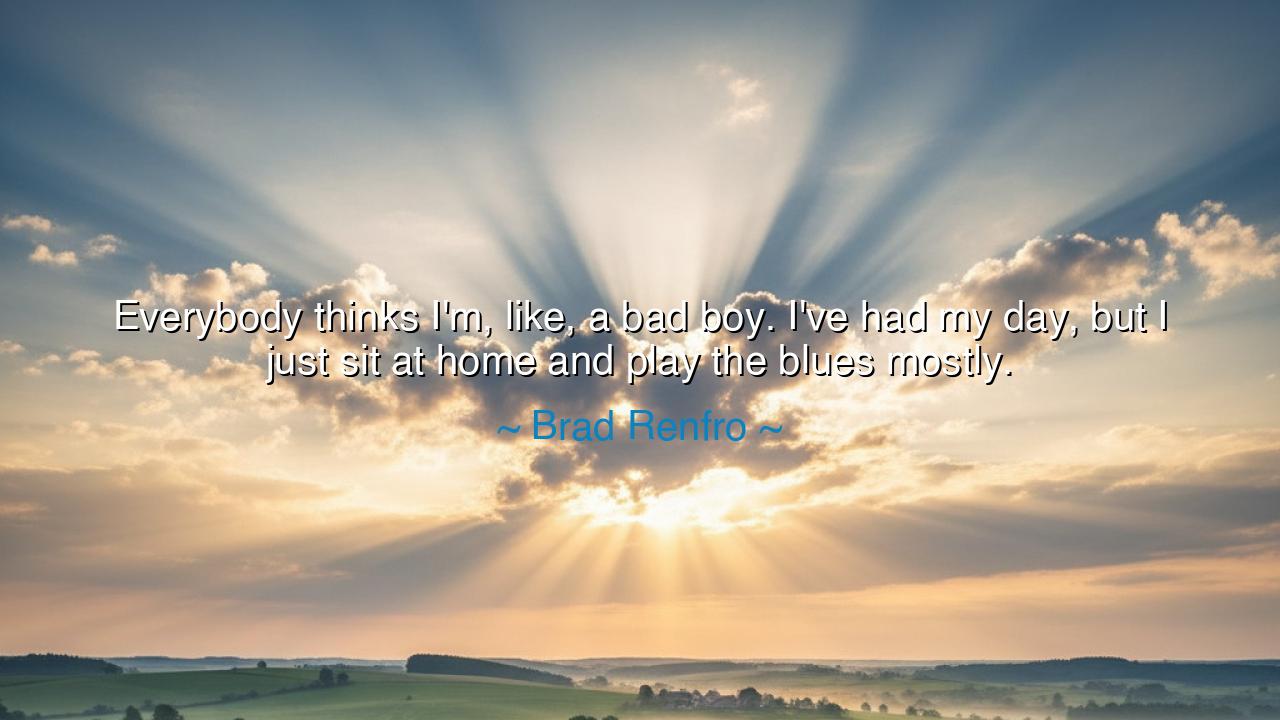
Everybody thinks I'm, like, a bad boy. I've had my day, but I
Everybody thinks I'm, like, a bad boy. I've had my day, but I just sit at home and play the blues mostly.






In the haunting and tender words of Brad Renfro, a soul both gifted and tormented, there speaks a truth older than fame itself: “Everybody thinks I’m, like, a bad boy. I’ve had my day, but I just sit at home and play the blues mostly.” Beneath the simplicity of his confession lies a song of sorrow, misunderstood humanity, and the yearning for peace after the storm. Like an ancient lament sung by one who has walked through both glory and ruin, these words are not a defense—they are a revelation: that beneath every tale of rebellion lies a heart searching for redemption.
Brad Renfro was once a child prodigy of the screen, cast into the world’s gaze too early, too bright. He rose swiftly through the fire of fame, celebrated for his raw power and authenticity in roles that mirrored his own life—roles of outsiders, rebels, and lost souls. Yet fame, that fickle god, devours as easily as it blesses. Missteps became headlines, mistakes became myths, and the boy who once shone became labeled as the bad boy—a mask that hid the gentler truth of who he was. In his words, “I just sit at home and play the blues,” we hear the weary voice of one who has seen the cost of image, and who longs, at last, for the quiet company of music and memory.
To play the blues is to confess through melody what words cannot hold. It is to speak with the heart, not the tongue. The ancients might have called it catharsis—the purging of sorrow through beauty. Just as the poets of old found peace in verse, so Renfro found it in the humble act of playing his guitar. The blues has always belonged to those who have been misunderstood, who have walked through darkness and still found a rhythm in their pain. In this, Renfro joins the lineage of mournful heroes—from the psalmist David to the wandering bluesmen of the Mississippi Delta—each one using music as prayer, as release, as a bridge between suffering and serenity.
There is an ancient story of the poet Orpheus, who played the lyre so beautifully that even the stones wept. When he lost his beloved Eurydice, he did not rage or despair; instead, he played. His song became his solace, his rebellion against the silence of death. In Renfro’s quote, there is something of Orpheus—a recognition that one cannot always conquer fate, but one can answer it with grace. By “playing the blues,” he does not escape his past; he transforms it. His music becomes his confession, his offering, his redemption.
The bad boy image that the world bestowed upon him is the tragedy of perception—the age-old mistake of seeing the shadow and ignoring the light. The world loves to craft myths of rebellion but seldom seeks to understand the rebel’s heart. Renfro’s quiet defiance, in saying he spends his days at home playing music, is a reclaiming of his humanity. It is as though he whispers to the world: “You may know my name, but not my soul.” Such is the plight of many artists—judged by rumor, yet known only through the honesty of their art.
From this, we learn a truth worthy of the sages: that reputation is but an echo, and the soul’s music is its true voice. Every person, no matter how flawed or fallen, carries within them a song of redemption. When Renfro says he “plays the blues,” he speaks for all who have been wounded by life yet refuse to surrender to bitterness. His act is not of indulgence, but of healing—of taking the broken strings of existence and coaxing from them one last beautiful sound.
Let this be the lesson for the living: do not be deceived by appearances, nor by the stories others tell of a man. Seek the truth in his actions when no one watches, in the quiet of his home, in the way he treats his art and his own soul. Learn also from Renfro that peace is not found in the noise of fame or the applause of the world—it is found in the stillness of creation, in the moments when we make beauty from pain.
And so, O listener, when the world calls you by names that do not fit, when your past feels heavier than your hope, remember Brad Renfro’s humble wisdom. Go home. Pick up your instrument—whatever it may be—and play your own blues. Turn your sorrow into song, your mistakes into melody. For the world may never understand you, but in the music of honesty, you will find what it cannot take from you: your soul, your truth, and your peace.






AAdministratorAdministrator
Welcome, honored guests. Please leave a comment, we will respond soon